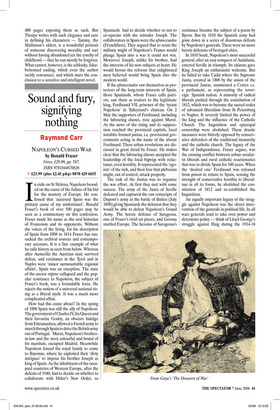The intelligentsia head south
Jonathan Beckman
THE STANDING POOL by Adam Thorpe Cape, £16.99, pp. 423, ISBN 9780224079419 ✆ £13.59 (plus £2.45 p&p) 0870 429 6655 Adam Thorpe set his previous novel, Between Each Breath, in Hampstead. He moves in his latest to the liberal intelligentsia’s summer hunting ground, the south of France. Nick and Sarah Mallinson, two not quite successful enough Cambridge historians, decamp on their sabbatical to Languedoc with their three young daughters. Their house is rented from the Sandlers, a mercenary pair of art dealers; the husband, Alan, took advantage of the invasion of Iraq to bag a number of archaeological artefacts by dubious means. Intent on completing neglected books and homeeducating their children, the Mallinsons’ time dissipates into distraction and peacekeeping between warring kids. Meanwhile, the decidedly weird handyman, Jean-Luc, tends the English lawn that the Sandlers insist on cultivating, in spite of the unsuitable water table and the depredations of the local wild boar. Jean-Luc must also maintain the swimming pool — ‘the standing pool’ of the title — and the endless adjustments required to keep it algae-free and pH neutral are reflected in the lives of the Mallinsons, whose youthful ardour and ambition have been replaced with a constant paddling to stay afloat amidst domestic and professional demands.
Thorpe’s satire on the intellectual class at first seems gentle but has a relentlessness that renders it scorchingly bleak. Nick has failed to become a professor, his academic work has been briefly acclaimed before being forgotten and remaindered and, though he has renounced his solemn Marxism, he yearns for invigorating, active politics. The nearest he gets to that is the occasional whinge about George W. Bush. Sarah, who was Nick’s brilliant graduate student, has found that mothering has swamped her career. Despite being relatively young and in good health, the couple, in their brief moments of respite, ask variations on the same question: what is the point? Not in an I’m-about-to-slit-my-wrists way, but as people of intelligence and imagination who explore the zone between life as it could have been and as it is.
The psychotic element in the story is played out by Jean-Luc, a loner and the village punch-bag, who becomes obsessed by the Mallinsons and spends his spare time building a sculpture out of found objects that is part fetish, part monument to his uncle Fernand who was killed by the Nazis. The after-effects of the past has always been an abiding concern of Thorpe’s, particularly the way it sizzles underneath even detached, antiquarian interest. Houses don’t need ghosts to be haunted (Thorpe engineers a brilliant misidentification to underline this point). The Mallinsons, as keen historians, dabble in some local research, blithely unaware of how the uncertain wartime activities of Jean-Luc’s father and uncle still determine his strained relations with the rest of the villagers.
Nothing much happens in the novel because essential to the crafting of its characters’ psychology is the fact that these are people to whom nothing much happens. And if their lives are petty, peevish and narrow, perhaps it is overkill to expend 400 pages exposing them as such. But Thorpe writes with such elegance and care in defining his characters — Tammy, the Mallinson’s eldest, is a wonderful portrait of someone discovering morality and tact without having abandoned yet the cruelty of childhood — that he can mostly be forgiven. What cannot, however, is the schlocky, falsebottomed ending, which even the author tacitly renounces, and which mars the conclusion to a sensitive and intelligent novel.











































































 Previous page
Previous page